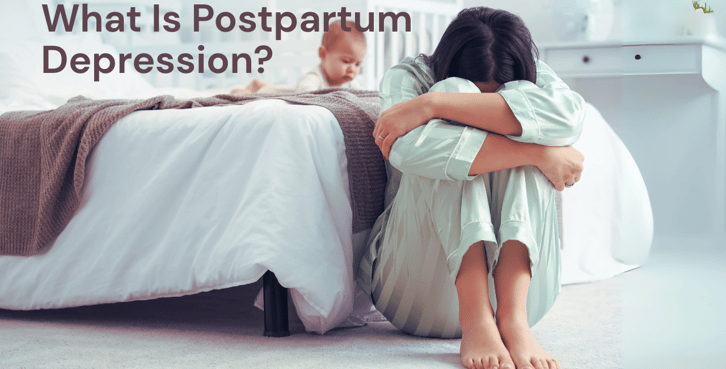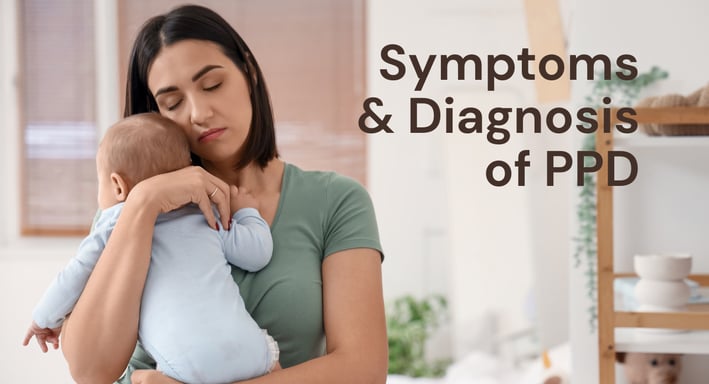What Is Postpartum Depression? Causes, Symptoms, and Diagnosis
6/5/20254 min read
Bringing a new life into the world is often portrayed as a blissful, joyous occasion—a time marked by cuddles, lullabies, and overwhelming love. Yet, for a significant number of new mothers, this chapter also ushers in unexpected emotional turbulence. One such challenge, often whispered about in hushed tones or overlooked altogether, is postpartum depression (PPD).
Postpartum depression is not simply a case of the "baby blues," nor is it a sign of weakness or a lack of maternal instinct. It is a real, diagnosable mental health condition that affects roughly 1 in 7 women after childbirth, according to the American Psychological Association. Understanding the causes, recognizing the symptoms, and knowing how it’s diagnosed can empower both new mothers and their support systems to seek timely help.
At Peace Temple, our team of licensed therapists has worked with countless women navigating the difficult terrain of postpartum mental health. Our goal is to break the stigma and offer evidence-based care in a safe, supportive environment.


What Is Postpartum Depression?
At its core, postpartum depression is a mood disorder that can occur in women (and in rarer cases, men) following the birth of a child. It’s characterized by intense feelings of sadness, anxiety, exhaustion, and detachment that go far beyond the short-lived emotional dips most new mothers experience in the first few weeks after delivery.
While the baby blues—a common and temporary condition—typically resolve within two weeks postpartum, postpartum depression persists longer and interferes with a person's ability to function in daily life. Left untreated, PPD can impact a mother's ability to bond with her baby, manage household responsibilities, or maintain personal relationships.
It's crucial to highlight that postpartum depression is not a flaw in character. It's a clinical condition rooted in a complex interplay of physical, emotional, and environmental factors.
Causes: Why Does Postpartum Depression Happen?
Pinpointing the exact cause of postpartum depression can be challenging, as it usually stems from a mix of biological, psychological, and social triggers. That said, several key contributors have been identified:
1. Hormonal Fluctuations
One of the most immediate and significant changes after childbirth is the dramatic drop in estrogen and progesterone levels. These hormones, which rise steadily during pregnancy, plummet post-delivery and can influence mood regulation. Additionally, disruptions in thyroid hormones may contribute to feelings of fatigue and depression.
2. Sleep Deprivation
It’s no secret that newborns demand round-the-clock care, which often results in fragmented or minimal sleep for parents. Chronic sleep deprivation can significantly alter brain chemistry, making it harder to cope with everyday stressors and contributing to mood instability.
3. Psychological History
Women with a history of depression, anxiety disorders, or bipolar disorder are at increased risk of developing postpartum depression. A prior episode of PPD also raises the likelihood of recurrence in future pregnancies.
4. Stress and Lifestyle Factors
Financial strain, lack of support, difficulties in the partner relationship, or complications during childbirth can all act as stressors. Feeling isolated or overwhelmed by the responsibilities of motherhood can intensify feelings of helplessness or despair.
Peace Temple’s therapeutic programs offer individualized support for mothers dealing with such stressors, ensuring that no one has to navigate postpartum challenges alone.
5. Unrealistic Expectations
Society often paints motherhood in glowing terms—smiling babies, intuitive parenting, and instant connection. When reality doesn’t match the idealized version, new mothers may feel inadequate or ashamed, compounding depressive symptoms.


Symptoms: Recognizing the Signs of Postpartum Depression
Identifying PPD can be tricky because its symptoms often overlap with normal postpartum experiences. However, the intensity, duration, and impact of these symptoms distinguish PPD from typical adjustment periods.
Some of the most common symptoms include:
Persistent sadness or hopelessness
Frequent crying spells
Loss of interest or pleasure in activities once enjoyed
Difficulty bonding with the baby
Changes in appetite or weight
Insomnia or excessive sleeping
Severe fatigue or lack of energy
Feelings of worthlessness, guilt, or inadequacy
Anxiety or panic attacks
Thoughts of harming oneself or the baby
These symptoms typically emerge within the first few weeks postpartum but can develop any time within the first year. Every mother’s experience is unique—there’s no universal checklist.
If you or someone you love is showing signs of postpartum depression, it’s important to reach out. Peace Temple offers free initial consultations to help individuals take that first, often hardest, step toward healing.
Diagnosis: How Is Postpartum Depression Identified?
Diagnosing postpartum depression involves more than just noting mood swings or occasional tears. Mental health professionals use standardized screening tools, clinical interviews, and personal history assessments to make an accurate diagnosis.
1. Screening Tools
One of the most widely used tools is the Edinburgh Postnatal Depression Scale (EPDS)—a 10-question self-report questionnaire designed to measure the severity of depressive symptoms.
2. Clinical Assessment
Healthcare providers, including obstetricians and primary care physicians, often conduct in-depth interviews to explore mood symptoms, daily functioning, and personal history.
3. Timing and Duration
For a formal diagnosis, symptoms must persist for more than two weeks and interfere with day-to-day functioning.
At Peace Temple, our licensed psychologists specialize in maternal mental health and use trauma-informed approaches to assess and treat postpartum-related conditions.
When to Seek Help
The idea of asking for help can feel daunting, especially for new mothers who may already feel under scrutiny or judged. But reaching out is a sign of strength—not weakness. Left untreated, postpartum depression can escalate, affecting not only the mother but also the baby’s development and the entire family dynamic.
Healthcare providers recommend seeking help if:
Sadness or anxiety feels unmanageable.
Daily tasks become overwhelming or impossible.
Bonding with the baby feels strained or absent.
There are intrusive thoughts of harm or self-injury.
Peace Temple’s postpartum support network includes therapists, support groups, and wellness resources designed to meet mothers exactly where they are—no judgment, just care.
Final Thoughts: Moving Toward Healing
Postpartum depression is not the end of the story—it’s a chapter that, with the right support, can be managed and overcome. From therapy and medication to peer support and holistic wellness practices, treatment options are effective and varied.
New mothers need space, not stigma. They deserve compassion, not correction. As a society, we must begin normalizing conversations around maternal mental health and ensure that no mother walks the postpartum path alone.
Because when we support mothers, we’re not just nurturing them—we’re helping raise healthier, happier families.
